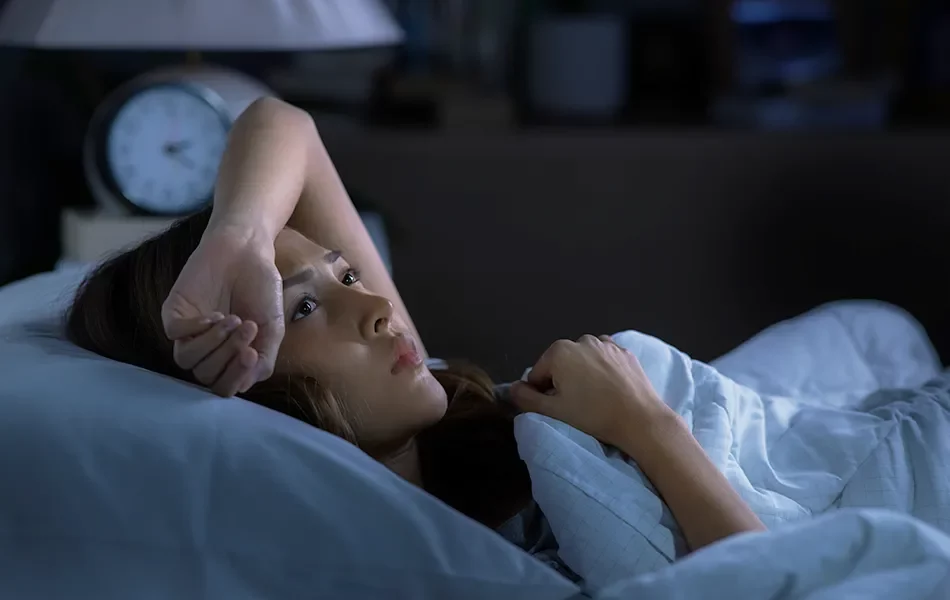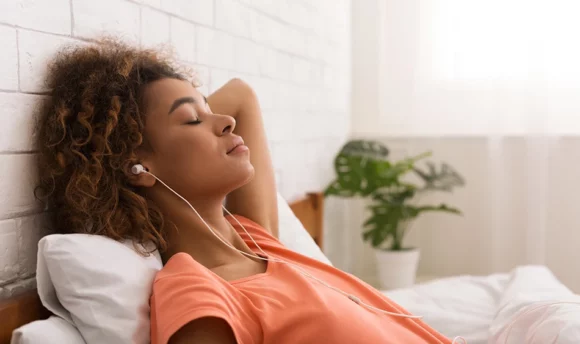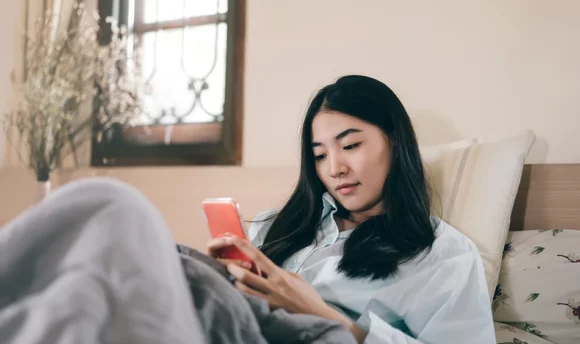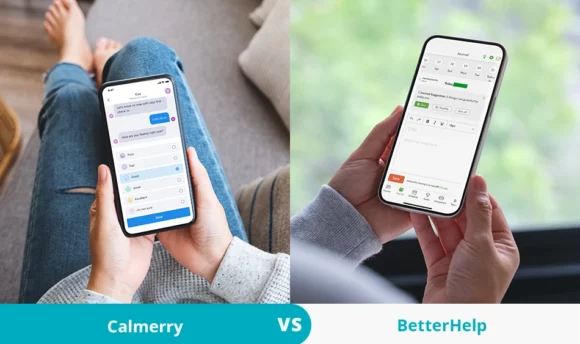How to Calm Anxiety at Night: Your Guide to Sleeping Well
Anxiety creeps up on you when you least expect it. For some people, the anxious feelings seem to brew at night, but how can you stop this from happening? We provide effective techniques that could calm anxiety and reasons why you might be feeling this way.

Staying awake all night with anxious thoughts is never a healthy occurrence. Anxiety is a draining emotion that can stop you from getting adequate rest.
Putting a stop to the constant worry could help you sleep. It might be challenging, but the longer you experience anxiety, the more likely you’ll develop insomnia.
There are a few common techniques to calm your feelings of uneasiness. Keep reading to gain more guidance on earning comfortable sleep.
How to Calm Anxiety at Night? 5 Effective Techniques
Getting a good night’s sleep shouldn’t be a challenging task. People with anxiety disorders often struggle to rest properly when they’re constantly overthinking. Learning some soothing techniques can help you overcome anxiety symptoms while preventing sleep deprivation.
Here are 5 ways how you can ease anxious feelings at night:
#1 Subscribe to a meditation or relaxation app
If you want to prevent panic attacks at night, subscribing to a mental health app may be the first step. Some apps contain journaling features and cognitive behavioral therapy (CBT). Research suggests that CBT can help you understand your own thoughts and why you may be getting them.
There are also meditation exercises that could calm your breathing. Practicing meditation can foster resilience to stress and encourage a sense of peace before you go to sleep. All you need to do is find a comfortable environment, close your eyes, and focus on taking deep breaths.
Apps are great resources because you can access them at any time. Even when you need to write something down, certain journaling apps will give you that opportunity.
#2 Listen to relaxing sounds
People sometimes fall asleep faster when there’s no silence. They can focus on soothing sounds that distract negative thoughts and self-destructive behaviors. Consider listening to thunder and rain or nature sounds to evoke a sense of peace in your nightly routine.
It’s been proven that music prevents stress-induced effects. A slow tempo quiets your mind, releases feel-good hormones, and relaxes your muscles. Everyone has their own taste in music, so listen to something that makes you happy and takes away the fear of night anxiety.
Listening to audiobooks or podcasts could also settle your mind. Put some headphones in and close your eyes or play these sounds in the background.
#3 Try breathing techniques
There are many breathing techniques that could prevent panic attacks.
One common technique is to breathe in deeply, hold your breath for 3–5 seconds, and let the air release slowly from your lungs. This can stop you from hyperventilating or getting chest pain due to high blood pressure.
The 4-7-8 method could also relax your mind and body. Close your mouth and inhale through your nose for around four seconds. Hold that breath for seven seconds and then exhale through your mouth for a total of eight seconds.
Breathing techniques might not work for everyone, but they’re worth a try if you’re feeling anxious before bedtime.
#4 Drink a cup of herbal tea
Drinking herbal tea could give you some comfort. They usually contain natural ingredients that tame your autonomic nervous system and encourage tiredness. Some of the best teas include peppermint, chamomile, lavender, valerian, and lemon.
Peppermint tea could reduce frustration and anxiety. The sweet aroma itself makes you feel calm and relaxed at night. This is the best tea for people who get stress-inducing feelings.
Chamomile, being a meditative plant, has been proven to reduce symptoms of anxiety disorders. It contains sedative properties that could help you get better sleep. Those who currently have a sleep disorder may drink chamomile tea to ease chronic insomnia.
When it comes to lavender, it reduces the physical symptoms associated with anxiety. These might be headaches, indigestion, and heart palpitations. Lavender has a calming effect without sedation, making it perfect for people who need good rest.
#5 Try aromatherapy
Aromatherapy is a healing treatment that uses essential oils to calm your mind. You can add these oils to diffusers around your house or place some on the inside of your wrist. Studies prove that this type of treatment could naturally relieve stress and improve sleep quality.
Consider getting lavender, peppermint, or chamomile oil. Just like with tea, these plants are the best for reducing anxiety symptoms and creating a peaceful environment.
Why Do I Get Anxious at Night?
People with anxiety disorder may experience intense worry at night. This is because they have more time to think and remember past events. Some might even get nocturnal panic attacks, which wake the person up in a state of fear and overwhelming worry.
Once the lights go out, your brain has the chance to think about daily stressors or upcoming plans that make you nervous. Being bombarded with intrusive thoughts will trigger anxiety and cause unwanted beliefs, including the fear of being hated or neglected by loved ones.
The silence may also put you in a state of unease. You could be awake for hours, unable to fall asleep due to panic and night sweats. Of course, some people feel anxious in the morning too, but nighttime is a deafening silence for those who can’t stop overthinking.
What Does Nighttime Anxiety Feel Like?
You might experience trembling, headaches, night sweats, chest pain, heart palpitations, and shortness of breath. These physical symptoms can worsen if you lie in bed since you have more time to process your thoughts and acknowledge concerns.
Not being able to fall asleep fast can be incredibly frustrating. You’re trying to get comfortable, but all you can think about is your stress and self-worth. This is exactly what nighttime anxiety can feel like for some, especially if the silence makes you feel more uneasy and panicked.
Getting comfortable in bed will have fewer distractions. You’re not watching TV or cooking to keep the bad thoughts away. Many people get nocturnal anxiety because it’s the only time when they can settle down and acknowledge how they’re feeling mentally and physically.
How to Fall Asleep With Anxiety?
Reading a book, listening to soothing sounds, or taking a warm bath before getting ready for bed is a good start. These habits can help relax your brain and promote restful sleep. Try not to go on your phone or scroll through social media while you’re lying in bed.
People who feel anxious won’t always fall asleep right away. Sometimes, they need better sleep hygiene to relax the central nervous system at night. Consider going to bed and waking up at the same time, exercising in the morning, limiting caffeine, and avoiding electronic devices.
It’s been proven that meditation can make you feel sleepy. Guided meditation tells you how to breathe properly and achieve progressive muscle relaxation. Most forms of anxiety stem from your overwhelmed mind, so it’s important to diminish those thoughts to prevent poor sleep.
FAQs
Sleeping to get rid of anxiety doesn’t work for everyone. Some people might wake up feeling better, while others still have chest pain and worrisome thoughts. You should never ignore these anxiety symptoms, especially if you’re noticing more sleep problems and panic attacks.
Being anxious can increase the stress hormones in your body. These hormones stop your brain from relaxing and winding down after a long day. Since you’re constantly tossing and turning, you’re more likely to gain paranoid thoughts, which prevent you from falling asleep naturally.
Yes, sleeping in could make someone with anxiety disorder feel worse. Research suggests that getting too much sleep can cause mental distress. This is because you feel unprepared for the day ahead, leading to a higher risk of panic attacks and a poor bedtime routine in the evening.
A Word From a Psychologist
Some people may develop sleep disorders due to nighttime anxiety. This is because they struggle to fall asleep when thinking bad thoughts. It’s important to practice good sleep hygiene, which involves going to bed at the same time every night and removing electronic devices.
You can try the 333 rule for anxiety to help settle your mind. This centers around sight, touch, and sound to help pull you out of a worrisome state. Focus your attention on objects in the room, listen to sounds inside and outside of your house, and touch things within your reach.
Remember that you shouldn’t have to face anxiety alone. Speak to a therapist about your sleep anxiety or talk to a doctor regarding physical symptoms like chest pain, headaches, and chronic fatigue.
Conclusion
You can calm nighttime anxiety by trying deep breathing techniques, drinking some herbal tea, listening to relaxing music, practicing meditation, and testing out aromatherapy. It’s also worth speaking to a medical professional if your anxious feelings are making you sleep-deprived.
Just remember that you aren’t unlovable or hated. Feeling this way at night can fuel anxiety, so aim to try the relaxation techniques above to get the rest you need.

















































 Select your language:
Select your language: 








